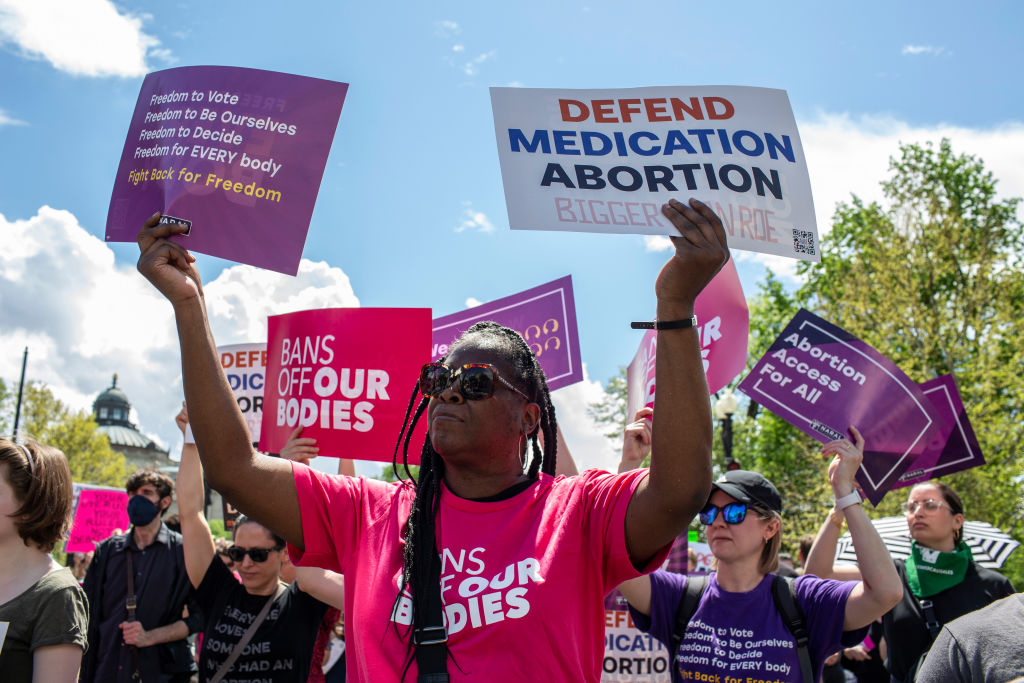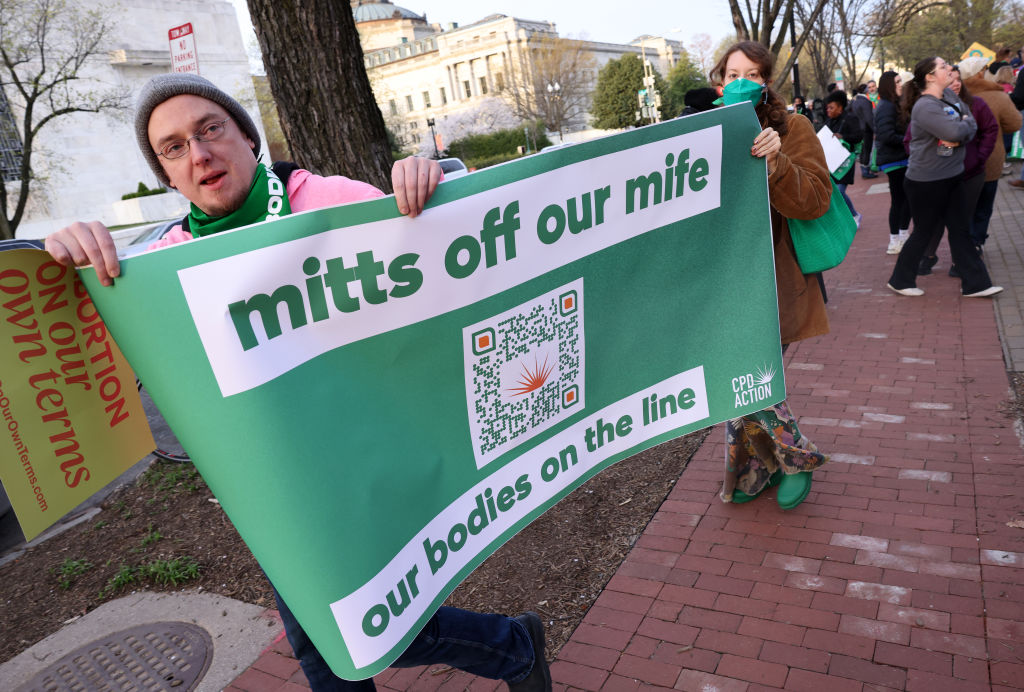The Abortion Pill on Trial
One of its key researchers says Mifepristone was tested “with three times or more rigor” than other drugs.
BY SAMHITA MUKHOPADHYAY
Today, the Supreme Court heard oral arguments in the first abortion case to come before the court since it overturned Roe v. Wade. The case, brought by the extremist group Alliance for Hippocratic Medicine (AHM), is challenging the U.S. Food and Drug Administration (FDA)—specifically the FDA’s 2016-2021 policies, which expanded access to the safe and effective abortion drug mifepristone, initially approved in 2000 and now the most common abortion method across the country. AHM’s main argument? That the FDA did not adequately study mifepristone’s safety risks. (We explain it more in-depth here.)
The implications of this decision could be disastrous. As Fatima Goss Graves, President and CEO at the National Women’s Law Center, told us, “Banning mifepristone would upend abortion care not just in the conservative states that have been racing to ban it—but in all 50 states, no matter their laws.”
But the case itself is farfetched, argues Dr. Lisa Haddad, the medical director for the Population Council’s Center for Biomedical Research, the nonprofit research center that led clinical testing on mifepristone more than two decades ago. In fact, she points out, over 5 million people have successfully used it since then.
With the case now before the court, we spoke to Dr. Haddad and Dr. Beverly Winikoff, who worked at the Population Council for 25 years, where she was Program Director for Reproductive Health and Senior Medical Associate at the Council, which was the team that led clinical trials on mifepristone overseas. Now she serves as president of Gynuity Health Projects.

Samhita Mukhopadhyay: You worked with the organization that facilitated the FDA approval of mifepristone—what are you feeling right now?
Dr. Beverly Winikoff: I feel like I’m charging into the skirmish. I’m getting girded up. Can’t these people ever go away? But it is very, very encouraging to see how everyday people understand that this is a highly political, not a scientific discussion.
Dr. Lisa Haddad: I feel very frustrated and a little bit beaten up. And while I’m inspired by some of the voices speaking up in support of mifepristone, I see this trend in reducing access for women, and I’m scared that the science and the excellent evidence that supports this as a way to improve health outcomes will be overlooked and minimized. It’s a slippery slope.
BW: I think in the end, it’ll be okay because of the politics—the FDA is there to do a job, and it has always done it quite well in protecting the public. And this is an attack on the FDA. When you look at it that way, there are many people who are on our side, including big pharma—because if this happens, they have no [incentive] to be able to put money into new drugs because somebody could come up and decide that they don’t like that drug and they can [sue to] override the FDA, and that would be chaotic in the pharmaceutical world. It’s not just abortion; it’s every drug that gets approved. I think the politics of it is much bigger than abortion.
That’s a good point. Can you walk us through what we need to know about the FDA approval of mifepristone? Was it the standard approval process or was it a long, hard-fought win?
BW: It was cover-your-ass time the whole way along by the FDA. That was it. That was the theme. So, every single thing was done with three times or more rigor than any other drug I’ve ever heard of. But that’s okay because the drug is very good and very safe. We also got the FDA staff to be very excited about it. People were really very interested in making sure it got through.
When we did the final studies, we had several thousand people, and it performed very, very well. We were very attached to this product because it seemed safer and more effective than you could expect. So people were very excited about it because it had the potential to be a workaround for some of the political stuff of having to go to a clinic. You were doing it at home.
Dr. Haddad, can you speak to the significance of Tuesday’s case? Depending on the decision, what could the implication be?
LH: An increasing number of individuals are getting access to abortion only through medication abortion. I’m in Georgia, where we have a 6-week abortion ban. Finding out that you’re pregnant, making an appointment, getting off of work, getting a way to get there, and all of that before six weeks is hard. But if people make it to the clinic, medication abortion at that very, very early gestational age is a potentially good option for individuals, and the addition of mifepristone [generally used with misoprostol] enhances the likelihood of success. Also, without mifepristone, the barriers to access are huge. It’ll make it even harder for more individuals to obtain care.

And what could this case mean for misoprostol?
BW: Well, one of the things that mifepristone does is soften the cervix. So that means that whatever’s coming out doesn’t have as hard a time. And there are a lot of pain fibers in the cervix, so it could be more painful to just use misoprostol. But you can do it for most people. It will work, but it’s not maybe as pleasant.
LH: An abortion with mifepristone is gentler on the body, it gives the person a little bit more control, and it’s more predictable in terms of how it’s going to go.
BW: What saves the day for some of these other drugs is that they have other uses. So methotrexate is also abortifacient, but nobody’s trying to take that off the market. Nor misoprostol, actually. [Methotrexate is used for cancer while misoprostol can be used to treat ulcers and to induce labor] And so I think one of the things is maybe to get drugs that have dual purposes.
LH: And there are opportunities for that. Mifepristone does have utility for other indications. There’s excellent evidence that it’s great for fibroids and that it can be used for contraception. There is evidence, and it’s used commonly as emergency contraception in many countries. It’s just not approved in the U.S., and so I wonder whether or not that would enhance its security.
BW: Yeah, somebody should put it in for approval.
LH: We’re actually trying to garner support to do that right now, Beverly. But again, the evidence in the [case] is ridiculous when you break it down. It’s challenging the ability of scientists to make a decision, but not on all issues, just an issue that bothers [the plaintiffs] morally. But it’s not based on science. It’s frustrating to see because just the fact that we’ve gotten this far—I mean, it shouldn’t have a foot to stand on, and yet it is at the Supreme Court.
BW: I think it’s a terrible thing for individuals—not just people wanting abortion, people who want to use drugs for anything.
LH: And even, I mean right now, the standard of care shows that the mifepristone regimen works better for miscarriage management. This focus on something that really shouldn’t even be questioned just highlights the [message] that women are not trusted, women need to suffer, and that doctors and scientists can’t be trusted. Also, on top of what Beverly said, I just want to highlight that it’s not just the FDA that says [mifepristone] is safe. All of the different medical agencies like ACOG and the Society of Maternal-Fetal Medicine, say that mifepristone is incredibly safe with very few adverse events. We know the risks are incredibly low, less than 0.3% of any sort of serious, major adverse events. The risk of death is almost non-existent, whereas if you compare that to forcing somebody to continue with a pregnancy, we know that those risks are.
Over 5 million people have used mifepristone for either medication abortion or miscarriage management. This is not something that is not well evaluated.
As of right now, medication abortion is still available. Learn more here.